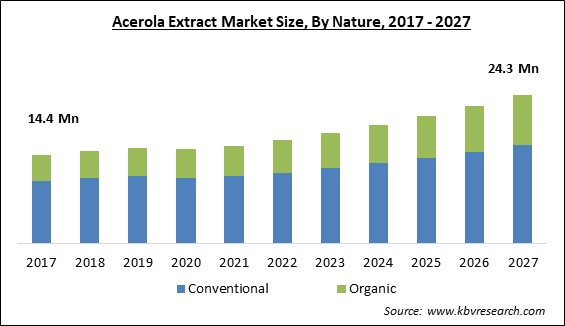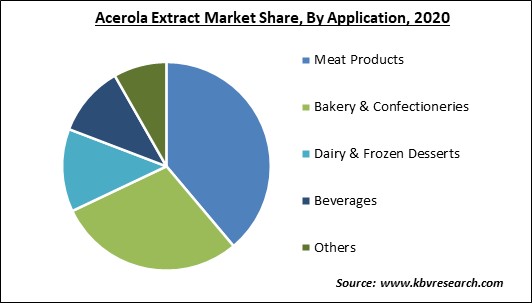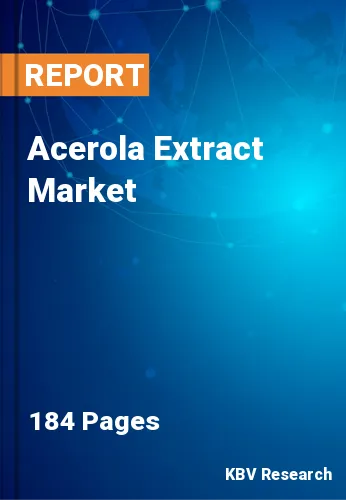The Global Acerola Extract Market size is expected to reach $24.3 million by 2027, rising at a market growth of 7.3% CAGR during the forecast period.
Acerola is a little tree with cherry-like fruits that is referred to as the acerola cherry due to its size and shape. Vitamin C, vitamin A, thiamine, and niacin are all abundant in this fruit, which is native to warm areas of the Western Hemisphere. It also contains a lot of antioxidants. In addition, this fruit extract is utilized in bakery items, defrosted dairy, confectionery products, jams and candies, drinks, and snacks, among other things. Moreover, they are also employed in dietary fiber supplements and nutritional supplements.
It has a cherry-like appearance but is much smaller in size. It is also high in vitamin B1, Vitamin A, B3, and B2, as well as Vitamin C, which is extremely nutrient-dense. In addition, the fruit is also known for its antioxidant properties, bioflavonoids, and carotenoids, among other nutrients. The acerola tree is also planted for its use as a hedge and as a decorative plant.
Because of the berry's nutritional and physiological benefits, acerola extraction is witnessing a huge surge in the number of industries that use it in their products. Moreover, the increase in demand for acerola extracts in the beverage industry is largely due to a shift in public preference to the availability of low-calorie beverages. Additionally, in recent years, the rising demand for organic food components among food manufacturers has generated the potential for the acerola extracts market to grow. Furthermore, the beneficial properties of acerola extract on skin cells are boosting its application in the private care sector.

COVID-19 is expected to have an impact on the majority of enterprises in the food and beverage industry. Indeed, the industry’s pessimistic predictions are becoming a reality due to falling raw material costs, supply chain bottlenecks, spending slowdowns, and credit market concerns. To assist in curbing the spread of the virus and for economic reasons, some big food and beverage corporations have closed operations and are considering the extent of layoffs. For example, the food and beverage manufacturing industry, which employs thousands of people in the United States, is expected to be hard hit during this outbreak, owing to two factors viz. various jobs are on-site and cannot be performed remotely, and second, supply has been reduced due to slowed economic activity. Businesses and governments place a high focus on protecting the health of their customers and employees.
Ascorbic acid is a water-soluble vitamin that is essential for good health. Humans, unlike most plants and animals, are unable to manufacture ascorbic acid. As a result, it is required as a dietary supplement for humans. Acerola is a vitamin C-rich natural food. In addition, acerola is one of the few fruits that include phenolics, anthocyanins, flavonoids, and carotenoids in significant amounts, in addition to being a good source of ascorbic acid. Additionally, Acerola is a popular supplement for preventing vitamin C insufficiency. It is also used to treat the common cold, diarrhea, and other ailments.
When it comes to food and beverage items, the clean label has become a new standard. Natural antioxidants in processed food products have become increasingly popular as consumers seek out natural products that incorporate intrinsically natural, fresh, nutritious, and balanced nutrients. In addition, consumers are willing to spend a premium price for a food or drink product created with components they recognize and trust. Consumers believe natural substances are safer and healthier, hence natural antioxidants are more likely to be approved than synthetic antioxidants. Acerola extract is getting popular in the food and beverage sector as a natural antioxidant. In the food and beverage business, the recent interest in clean-label products, which is slowly becoming mandated globally, presents a variety of potential opportunities for acerola extract manufacturers.
Acerola includes many phytonutrients like carotenoids, anthocyanins, phenolics, and flavonoids, and is one of the greatest natural sources of ascorbic acid. Acerola has a large reservoir of phytonutrients, which gives it a superior antioxidant capacity and a variety of additional benefits. Apart from acerola, there are a number of other natural sources that are high in antioxidants, such as rosemary extract and green tea extracts. The Mediterranean herb Rosmarinus officinalis is used to make rosemary extract. The antioxidant properties of rosemary are attributed to the phenolic chemicals found in the plant.

Based on Form, the market is segmented into Dry and Liquid. The Liquid segment held a significant revenue share of the Acerola Extract Market in 2020. This is because some people prefer liquid acerola over dry form as it is easy to consume. In addition, many players are rolling out innovative liquid products to fulfill the changing customer preferences.
Based on Nature, the market is segmented into Conventional and Organic. In 2020, the Conventional segment garnered the maximum revenue share of the Acerola Extract Market. Synthetic chemical fertilizers, insecticides, herbicides, and other continuous inputs are used in traditional acerola farming. As a result, traditional acerola farming is often resource- and energy-intensive, raising the total cost of production. When compared to organic farming, traditional farming has higher productivity.
Based on Application, the market is segmented into Meat Products, Bakery & Confectioneries, Dairy & Frozen Desserts, Beverages, and Others. In 2020, the Meat Products segment collected the maximum revenue share of the Acerola Extract Market. This is because consumers regard color to be the most important aspect in judging the quality of fresh meat. The color of the meat alone is used by consumers to assess its freshness. As a result, it's critical for meat producers to avoid color loss in their goods in order to attract and maintain customers. By successfully slowing the oxidation of the iron ion in the myoglobin molecule, the acerola extract helps to delay color loss. Moreover, it maintains the hue of fresh meat (myoglobin) decreased, enabling it to retain color.
| Report Attribute | Details |
|---|---|
| Market size value in 2020 | USD 15.5 Million |
| Market size forecast in 2027 | USD 24.3 Million |
| Base Year | 2020 |
| Historical Period | 2017 to 2019 |
| Forecast Period | 2021 to 2027 |
| Revenue Growth Rate | CAGR of 7.3% from 2021 to 2027 |
| Number of Pages | 184 |
| Number of Tables | 350 |
| Report coverage | Market Trends, Revenue Estimation and Forecast, Segmentation Analysis, Regional and Country Breakdown, Companies Strategic Developments, Company Profiling |
| Segments covered | Form, Nature, Application, Region |
| Country scope | US, Canada, Mexico, Germany, UK, France, Russia, Spain, Italy, China, Japan, India, South Korea, Singapore, Malaysia, Brazil, Argentina, UAE, Saudi Arabia, South Africa, Nigeria |
| Growth Drivers |
|
| Restraints |
|
Based on Regions, the market is segmented into North America, Europe, Asia Pacific, and Latin America, Middle East & Africa. In 2020, North America emerged as the dominating region in the overall Acerola Extract Market. This is because of the high consumption of acerola in the countries like the US and Canada of the regional market. In addition, the region is home to some of the prominent market players that are constantly involved in introducing unique products with attractive packaging and prices.
Free Valuable Insights: Global Acerola Extract Market size to reach USD 24.3 Million by 2027
The market research report covers the analysis of key stake holders of the market. Key companies profiled in the report include Döhler Gmbh, Koninklijke DSM N.V., Handary S.A., Kemin Industries, Inc., Foodchem International Corporation, Nexira, Inc., Amway Corporation, The Green Labs LLC, Givaudan S.A., and Symrise AG.
By Form
By Nature
By Application
By Geography
The acerola extract market size is projected to reach USD 24.3 million by 2027.
High awareness about the health advantages of acerola extract are driving the market in coming years, however, substitutes are readily available limited the growth of the market.
Döhler Gmbh, Koninklijke DSM N.V., Handary S.A., Kemin Industries, Inc., Foodchem International Corporation, Nexira, Inc., Amway Corporation, The Green Labs LLC, Givaudan S.A., and Symrise AG.
The Dry market dominated the Global Acerola Extract Market by Form in 2020, and would continue to be a dominant market till 2027.
The Bakery & Confectioneries market has high growth rate of 7.5% during (2021 - 2027).
The North America market dominated the Global Acerola Extract Market by Region in 2020, and would continue to be a dominant market till 2027.
Our team of dedicated experts can provide you with attractive expansion opportunities for your business.

